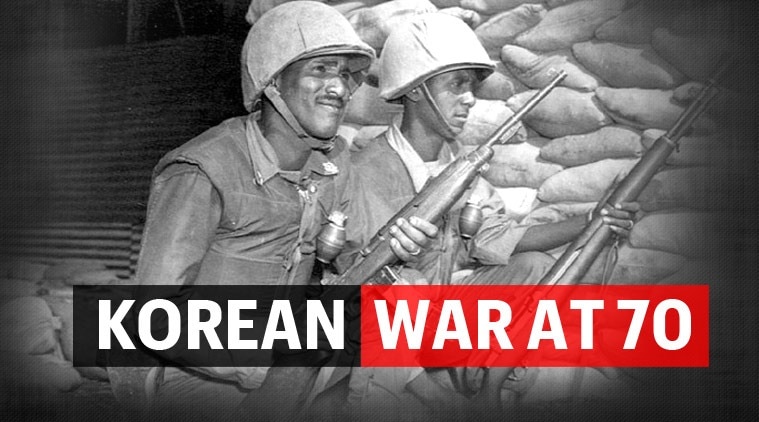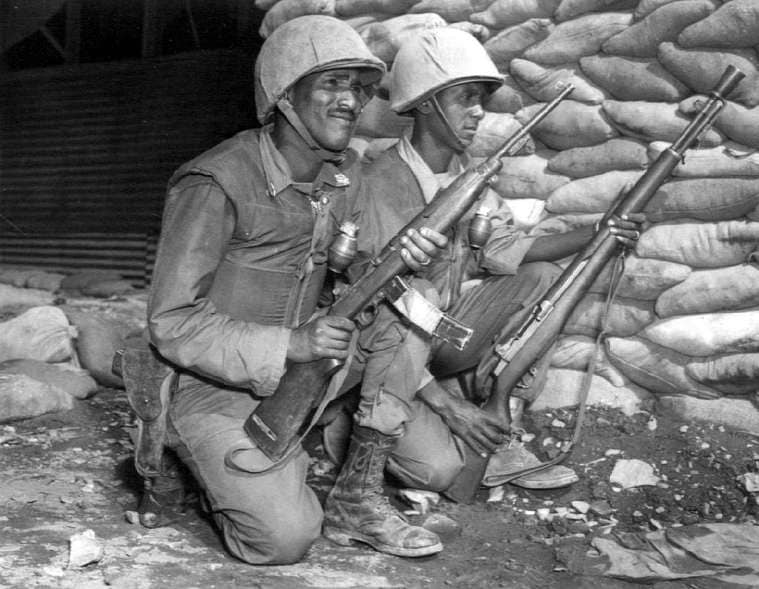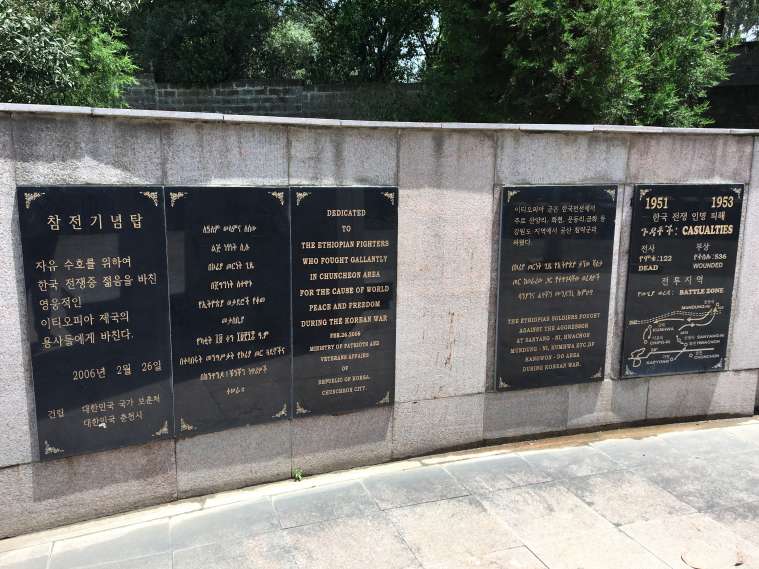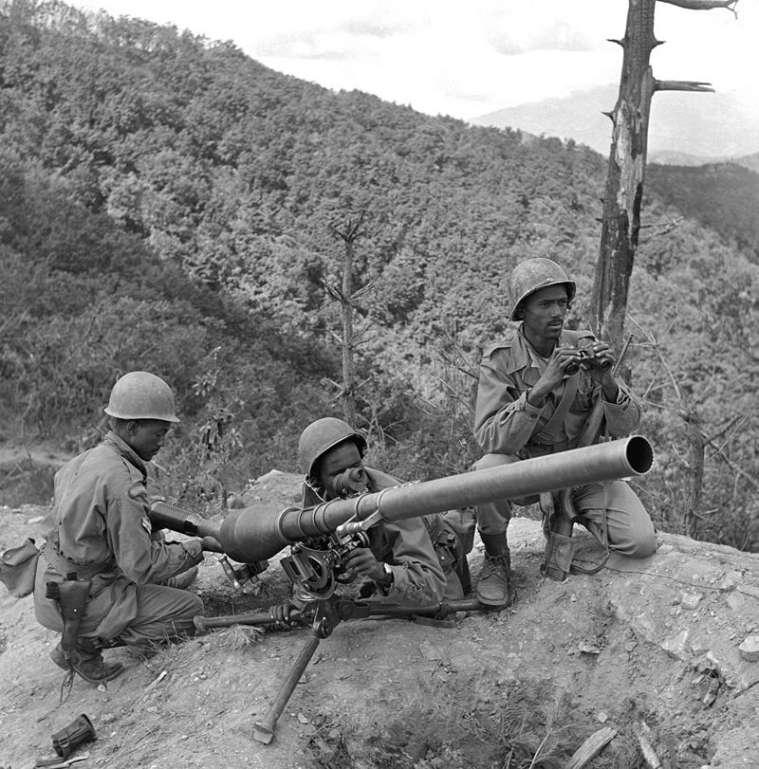It was the first time that Ethiopia had been involved in a war outside the African continent. A closer look at Ethiopia's history during and after the Second World War shows why the country became involved in an unrelated war so far away.
Sergeant Asfaw Abebe, 92, takes two taxis from his home in Kotebe, a neighbourhood in the Addis Ababa metropolitan area to reach the Ethiopia Korean War Veterans Park located in the heart of the city, to collect his monthly pension. Abebe is one of the 131 surviving Ethiopian soldiers who fought in the Korean War as part of the Kagnew Battalion in the United Nations Command.
The term ‘Kagnew’ in Ahmaric has two meanings; the first being “to bring order out of chaos” and the second, “to overthrow’, according to Kimon Skordiles who has conducted extensive research on this battalion during the Korean War, perhaps both befitting the tumult that wrecked the Korean Peninsula for over three years. In July 1950, when UN Secretary-General Trygve Halvdan Lie asked Ethiopia to send troops to Korea to fight as part of the United Nations Command, Emperor Haile Selassie I obliged, making Ethiopia the only nation in the African continent to do so.
The emperor had passed an official circular, ordering the formation of five battalions and the men who formed the Kagnew Battalion came from Haile Selassie I’s Kebur Zebenya, the Ethiopian Imperial Guard, an elite infantry division whose primary responsibilities involved protecting the emperor and had received special military training from the Swedish military in the 1930s.
On a Saturday morning, wearing a moss-green fedora with a small orange feather sticking out on the side, protecting him from the light drizzle of Ethiopia’s summer monsoons, Abebe slowly walks into the premises of the Ethiopia Korean War Veterans Park only to find the administrative office closed. Just beside the office is the Monument for the Participation of Ethiopia in the Korean War, an imposing structure that was established in this park in May 1968 by the Association of UN Participated Nations, along with citizens of the South Korean city of Chuncheon, in commemoration of the Ethiopian soldiers who fought in the war.
With the administrative office closed, Abebe walks around the memorial, looking at the plaques with inscriptions of the names of fallen soldiers. By the time he had been dispatched to Korea in July 1954, the Korean War had been halted due to an armistice agreement the previous year, and Abebe had been sent as part of the Fourth Kagnew under Lieutenant Colonel Asfaw Habta Maryam on a peacekeeping mission. Some 70 years have passed since. Today, looking at the names on the plaques in the park reminds him of his time in Korea, but not so much of his compatriots’ faces. Abebe points to some names that sound familiar, but that is about it.
Brutal winters of Korea
“I remember the snow and the cold. We were really suffering in the war because of the cold,” says Abebe, demonstrating the size of ice blocks that he came across. For many Ethiopian soldiers who fought in the Korean War, it was the first time they had encountered snow and the harsh winters of the Korean Peninsula. Prior to getting dispatched to Korea, members of the Kagnew Battalion were sent for training in the Ethiopian Highlands for eight months, focusing on ambush defences and combat patrol, but it did little to prepare them for the unfamiliar terrain and weather conditions of Korea.
A former member of the Emperor Haile Selassie I’s Imperial Guard, Abebe is a little more than 6 feet tall and stands upright despite his age. The years have only slowed his gait.
“It was very cold. Only our eyes were visible and everything else was covered. There is no other country with more snow than Korea,” he says with a laugh. Abebe does an impromptu slow march and breathes heavily, demonstrating how difficult it was for him to walk in the snow in three layers of clothing. When the Kagnew Battalion had first reached Korea in 1951, their uniforms, like those of soldiers from Australia, had been inadequate to counter the bitter cold. Documents show that the Ethiopian government and the United States had to jointly step in to provide necessary protective clothing for the battalion.
A war of firsts
Ethiopia’s participation in the Korean War meant many firsts. It was the first time that Ethiopia had been involved in a war outside the African continent. It was also the first time Ethiopian women had left the country for military nursing duties along with soldiers, following extensive training, for a war and a land so foreign to them. US military records state that Ethiopia was also among the first countries to provide a complete unit of ground troops as part of the UN Command forces in Korea.
According to records of South Korea’s Ministry of National Defence, 3,518 soldiers fought during the three years of the Korean War, making them one of the smallest United Nations forces in terms of the number of soldiers to participate during the war. The first Kagnew Battalion that sailed from neighbouring Djibouti on the US naval vessel ‘General MacRae’ arrived in Korea in March 1951 and was attached to the 7th Infantry Division of the US Army. Upon their arrival in Korea, the first battalion was greeted by Rhee Syngman and were stationed at the UN center in Taegu, where they were once again trained in using American weapons and other military equipment. The Kagnew Battalion fought in five rotations during the war years, some 253 battles, where 121 Ethiopian soldiers were killed and 536 men wounded.
The most notable of their performances in the Korean War were during infantry battles fought in the areas known as the Pork Chop Hill and the Old Baldy. Not one member of the Kagnew Battalion was ever captured by Communist forces and nor did the battalion ever surrender any ground, a record among the forces of the UN Command.
“Many of my friends died in the war. When the enemies came, the Ethiopians chose to end their lives instead of being taken as captives,” recalls Abebe. “The Chinese were told that if they captured any Ethiopian soldier alive, they would be given military promotions. This included any belongings found on the bodies of the soldiers. The Ethiopians were attacked many times, but no soldier was ever captured.” Despite the brutality of the war, and the Kagnew Battalion fighting on the front-lines for the entire duration of the war, there were relatively few casualties in comparison among soldiers of this battalion.
While Abebe himself did not suffer any major injuries during his time in Korea, some compatriots who hadn’t been as fortunate had to be transported to Seoul for treatment.
According to writings in records belonging to South Korea’s Ministry of National Defence and research by Dr. Ahmed Hassen, director of the Institute for Ethiopian Studies at the University of Addis Ababa, the Kagnew Battalion “had a special affinity for moving and fighting in the dark. Further, the Ethiopians spoke… always in an unknown tongue. This hexed the enemy as he was fighting a phantom.”
Documentation from during the Korean War shows that while the Kagnew Battalion’s Amharic language abilities were an advantage when facing communist forces, senior military officials in the battalion made efforts to learn English to aid communication with the UN Command forces, especially when it came to the use of medical facilities.
The logistics of the Korean War had been a challenge for the UN Command that had asked 15 countries for military support and seven others for medical assistance. This meant making arrangements for troops from different parts of the world, all of whom had different cultures and food habits, and required uniforms and gear specifically manufactured for the conditions in Korea.
Combat rations had to reflect these cultural and religious requirements and while records show that this was not an insurmountable challenge, it was neither straightforward. With the exception of Commonwealth nations during the Korean War, the United States provided rations, uniforms, military equipment, transport and weapons for soldiers during the war. “The French insisted on baking their own bread, and the Ethiopians cooked their own meals in accordance with Ethiopian Orthodox (Coptic) tradition,” Wayne Danzik writes in an essay titled ‘Coalition Forces in the Korean War’ for the 1994 issue of the Naval War College Review.
Aftermath of colonial brutality
A closer look at Ethiopia’s history during and after the Second World War shows why the country became involved in an unrelated war so far away. A little less than two decades prior to the start of the Korean War, Ethiopia had been invaded and occupied by Italian Fascist forces under Benito Mussolini, who had interrupted Emperor Haile Sellasie I’s reign. The emperor’s repeated requests for assistance to the League of Nations were ignored and Haile Sellasie I was forced to go into exile. Victor Emmanuel III, the king of Italy, occupied the country, and the occupation lasted till May 1941, a particularly brutal period in Ethiopia’s history.
The betrayal of the League of Nations and Britain’s subsequent exploitation of Ethiopia’s resources after the defeat of Italian fascist forces, in many ways caused Emperor Haile Selassie I to gravitate towards the United States after he reclaimed the throne. “When he returned to Ethiopia in 1941, Emperor Haile Selassie I had help from the British who saw their gesture as a ‘mopping up operation’ of the enemy from North East Africa at the start of the Second World War. Partly for the reason of the ‘mopping up’ and partly for colonialist purposes, the British then adamantly refused to hand over the government, especially the military side, to the Ethiopian state,” says Tsehai Berhane-Selassie, academic and author of ‘Ethiopian Warriorhood: Defence, Land and Society 1800-1941’.
“Haile Selassie I had to use a radical policy of seeking alliances from afar, specifically the US, which then got rid of the British from Ethiopia. In the process, the British emptied the coffers of the country, including resources that the enemy had left behind, leaving the government of Haile Selassie I with nothing with which to put back his administration and military structure.”
“The Americans were watching all this time, and the Emperor met with Franklin Roosevelt and they got on fine. It was the start of a new alliance. Keep in mind Haile Selassie was brilliant at statecraft, just as Menelik was before him,” explains Jeff Pearce, author of ‘Prevail: The Inspiring Story of Ethiopia’s Victory Over Mussolini’s Invasion, 1935-1941’. “The war had been a hugely traumatic experience for Ethiopians, himself included, and he wanted to ensure his country was safe from now on.”
Historians of the Korean War believe that the UN’s call for troops for the Korean War gave Emperor Haile Selassie I the opportunity to build and strengthen diplomatic alliances following the Second World War, that he believed would protect Ethiopia and perhaps give the country a more significant role in the politics of the Horn of Africa.
A diplomat’s memoirs
Imru Zelleke, who served as Ethiopia’s Ambassador to West Germany in 1955, is a former diplomat who now lives in Virginia in the US. The son of a minister in Emperor Haile Selassie I’s first cabinet and a grandson of a founder of Addis Ababa, Zelleke has observed Ethiopia’s foreign affairs from a particularly unique perspective and has documented his experiences in his autobiography titled ‘A Journey: Memoirs’.
Following his return to Ethiopia as part of an official delegation to the UN in 1950, Zelleke writes: “I waited for about two hours before being called in, and the Emperor told me to inform the Americans of his decision that Ethiopia will contribute a military battalion to the UN forces in Korea, and to convey the same to our Minister in New York. I guess that the Emperor had consulted some of the high officials, like Ras Kassa, Ras Abebe, and the military before making his decision. Following the Emperor’s consent, a formal request was presented officially, which was nominally discussed and approved by the Crown Council and the Council of Ministers.”
However, it was what Zelleke wrote a little later in the book that helps explain Ethiopia’s presence in the Korean War. “I believe that it earned us the full support of the US with regard to the Eritrean question.”
“Why should Ethiopia care about the Korean War? Because Haile Selassie I was keen to incorporate Eritrea into Ethiopia after World War II, and the US was vital to securing approval from the United Nations,” explains Pearce.
The Horn of Africa became an important and complex battleground during the Cold War. While Ethiopia needed the support that an alliance with Western powers like the US would bring, the Americans believed that they too would benefit from having allies in the Horn of Africa region.
“Haile Selassie I was not just going to nod his head and agree with the Americans on everything, especially when they began throwing their weight around in the post-war world. But he was naturally more sympathetic to Western values. Backing up Washington over the Korean War ensured future support for his Eritrea initiative,” explains Pearce. For Ethiopia then, it was a complex combination of self-interests, a quest for influence in the region and a desire to acquire powerful allies that eventually pushed Ethiopia into the Korean War.
Zelleke’s writings in his autobiography help explain how closely the Eritrea initiative was connected with Ethiopia’s participation in the Korean War. Following Ethiopia’s vote at the UN in 1950 to intervene militarily in Korea, Zelleke remembers the US chargé d’affaires in Ethiopia asking him for a military contingent to help in the Korean War. Ethiopia’s then foriegn minister Aklilu Habte-Wold had not been in favour of military intervention in Korea and had instead suggested political and moral support.
Zelleke remembers Emperor Haile Selassie I asking him for his own perspective of the US’s request. “I answered that the UN Commission for Eritrea had given a divided report that had rendered a decision in our favour in serious doubt. It was also clear that without a strong backing from the US we could not win our cause,” he writes.
Ethiopia was looking at long-term international support, advanced military training and equipment for Ethiopian troops, as well as experience on the battlefield that would stand the men and the country in good stead. Ethiopia’s efforts paid off. In 1951, the US and Ethiopia signed a treaty of cooperation and economic aid under the presidency of F. D. Roosevelt. Following the Korean War, Ethiopia paid $42,000 for weapons that it chose to retain that had been provided by the US.
“It wasn’t just a trade-off, though. Haile Selassie I genuinely, sincerely believed in the principles of the United Nations, just as he did with the League of Nations in the 1930s,” explains Pearce. “Sure, his allies had let him down in 1935, but he wouldn’t follow their example. Ethiopia would answer the call. There’s also the matter of prestige.” He believes that the Kagnew Battalion would possibly not have played the unique role that it did in the Korean War without Imru pushing for Ethiopia’s involvement.
An ordinary soldier
“I was just an ordinary soldier,” says Abebe. “I carried the Garand, 30-06 caliber semi-automatic rifle.” When Abebe left for Korea, his wife had been pregnant with his oldest daughter, whom he got to see only after he returned when she was seven months old. During his absence, his salary was given by the Ethiopian government that helped his wife during that time. In the 1960s, he was once again deployed on a peacekeeping mission to the Congo. Abebe’s service in the Ethiopian military lasted 18 years. “I have another uniform that has 18 different medals hanging from it. Everytime I come (to the park), I wear these,” he says, gesturing towards his military badges, a smaller green one that he got for his assignment in Korea and a larger one that he got for the mission in the Congo.
The pension that Abebe gets every month is not a significant amount, he says; 600 Ethiopian Birr (approximately $17). But the pension gives him an excuse to wear his military badges today and a place to go. “We travelled by train to Djibouti before getting on a ship to Korea and we would sing songs in Amharic for motivation.” He hums a few lines of ditty he remembers: “Don’t worry Korea, don’t worry Korea; the heroes, the Ethiopian army will be arriving.”
Editorial note
The interview with Abebe was conducted in Addis Ababa in August 2018. Two years on, the Ethiopia Korean War Veterans Association informs that Abebe is now on bed rest. The South Korean government continues to engage with the veterans for their welfare through various initiatives, the most recent being the distribution of face masks and supplies following the COVID-19 outbreak. According to the veteran’s association, commemorative events planned for the 70th anniversary of the Korean War have had to be cancelled this year.
Source: Read Full Article













